Unit3 g2
人教版七年级上册_UNIT3SectionB2b
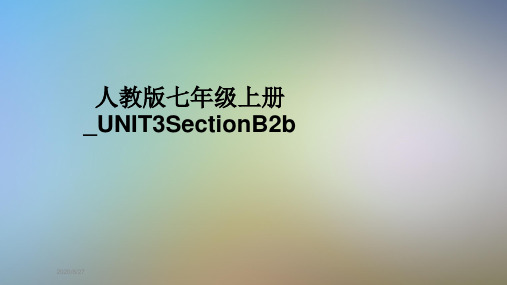
A.her
B.your
C.mine
D.my
( )5.A set of keys _C__in the school library.Is it ___?
A.is;her B.are ;hers C.is;hers D.are;her
3。按要求转换句型
1.This is my pen.(变为一般疑问句)
人教版七年级上册 _UNIT3SectionB2b
2020/8/27
单 Lin Hai, A computer game is in
数 the school library. Is it yours? Ask the teacher
for it.
学校
Mike
1. a computer game
2. in the school library 3. ask…for…
1. a computer game 2. in the school library 3. ask…for… 4.in Classroom 7E 5.E-mail sb.
6.my school ID card 7.must+动词原形 8.call sb at + 电话号码
一张计算机游戏 在图书馆里 向……要…… 在7E教室里 给某人发电子邮件 我的学生证
拨打电话找某人
1. 一张计算机游戏 2. 在学校图书馆里 3. 向……要…… 4. 在7E教室里 5.给某人发电子邮件 6.我的学生证
7. must+____ 8.拨打电话找某人
( )1.Please call Alan __C__495-5392
A.in
B.of
C.at
D.for
( )2.Some keys ___ in Classroom 3F .Please ask the teacher _B___them.
Unit 3 课后练习答案Keys to Exercises
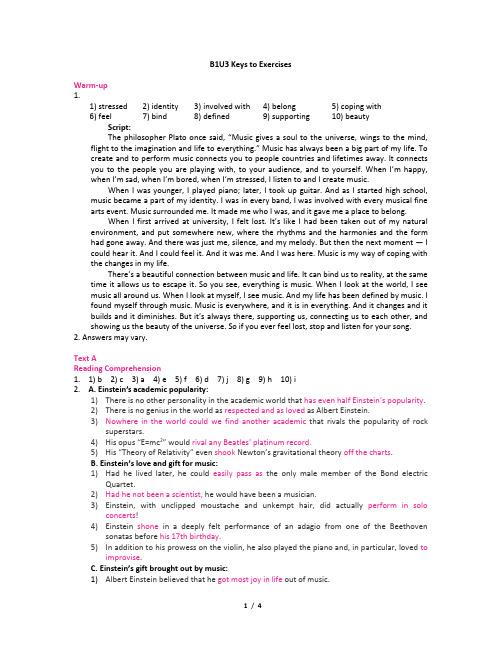
B1U3 Keys to ExercisesWarm-up1.1) stressed 2) identity 3) involved with 4) belong 5) coping with6) feel 7) bind 8) defined 9) supporting 10) beautyScript:The philosopher Plato once said, “Music gives a soul to the universe, wings to the mind, flight to the imagination and life to everything.” Music has always been a big part of my life. To create and to perform music connects you to people countries and lifetimes away. It connects you to the people you are playing with, to your audience, and to yourself. When I’m happy, when I’m sad, when I’m bored, when I’m stressed, I listen to and I create music.When I was younger, I played piano; later, I took up guitar. And as I started high school, music became a part of my identity. I was in every band, I was involved with every musical fine arts event. Music surrounded me. It made me who I was, and it gave me a place to belong.When I first arrived at university, I felt lost. It’s like I had been taken out of my natural environment, and put somewhere new, where the rhythms and the harmonies and the form had gone away. And there was just me, silence, and my melody. But then the next moment — I could hear it. And I could feel it. And it was me. And I was here. Music is my way of coping with the changes in my life.There’s a beautiful connection between music and life. It can bind us to reality, at the same time it allows us to escape it. So you see, everything is music. When I look at the world, I see music all around us. When I look at myself, I see music. And my life has been defined by music. I found myself through music. Music is everywhere, and it is in everything. And it changes and it builds and it diminishes. But it’s always there, supporting us, connecting us to each other, and showing us the beauty of the universe. So if you ever feel lost, stop and listen for your song. 2. Answers may vary.Text AReading Comprehension1.1) b 2) c 3) a 4) e 5) f 6) d 7) j 8) g 9) h 10) i2. A. Einstein’s academic popularity:1)There is no other personality in the academic world that has even half Einstein’s popularity.2)There is no genius in the world as respected and as loved as Albert Einstein.3)Nowhere in the world could we find another academic that rivals the popularity of rocksuperstars.4)His opus “E=mc2” would rival any Beatles’ platinum record.5)His “Theory of Relativity” even shook Newton’s gravitational theory off the charts.B. Einstein’s love and gift for music:1)Had he lived later, he could easily pass as the only male member of the Bond electricQuartet.2)Had he not been a scientist, he would have been a musician.3)Einstein, with unclipped moustache and unkempt hair, did actually perform in soloconcerts!4)Einstein shone in a deeply felt performance of an adagio from one of the Beethovensonatas before his 17th birthday.5)In addition to his prowess on the violin, he also played the piano and, in particular, loved toimprovise.C. Einstein’s gift brought out by music:1)Albert Einstein believed that he got most joy in life out of music.2)Albert Einstein himself admitted that the reason he was so smart was because he playedthe violin.3)One friend, G. J. Whitrow, confided that the way Einstein dealt with problems andequations was by improvising on the violin.4)Einstein’s second wife, Elsa, said that music helped him when he was thinking about histheories.5)His son Hans said that Albert Einstein took refuge in music, which would usually resolve allhis difficulties.D. Music —Einstein’s lifelong passion:1)Einstein always had time for music and often performed at musical evenings when he wasyoung.2)Einstein’s violin remained his constant companion till 1950 when he had to stop playing theinstrument due to problems affecting his left hand.3)Einstein’s love and passion for music was so great that he once remarked that most joy inhis life had come from his violin.3.1)Nowhere in the world could we find another academic that rivals the popularity of rocksuperstars. His opus “E=mc2” would rival any Beatles’ platinum record, his “Theory of Relativity” even shook Newton’s gravitational theory off the charts. He admitted that the reason he was so smart was because he played the violin.2)Instead of heeding their advice, Albert’s parents boug ht him a violin.3)Playing the violin made him so smart. By improvising on the violin, Einstein dealt withproblems and equations. Music helped him when he was thinking about his theories. He would take refuge in music and that would usually resolve all his difficulties.4)Because Einstein actually started playing the violin at the age of six, had a lifelong passion forit till late in life, and played with more sincerity or deeper feeling than many other musicians.5)His commitment to music brought him most of the joy in his life and made him the greatestphysicist in the world.Language in Use4.1) G 2) M 3) A 4) C 5) K6) L 7) J 8) E 9) B 10) F5.1) deal with; bring out; coming from2) leading to; falling in love with; take refuge3) Instead of; In particular; In fact; heed the advice6.e) about f) back g) up h) in1) bring about 2) brought back/brings back 3) brought … up 4) brought forth5) bring out 6) bringing down 7) has brought in 8) brought forward/forth7.1) hardship 2) popularized 3) Creative 4) impression 5) significant6) admirable 7) simplify 8) musical 9) performances 10) professional8. Reference translation1)描述天才时,爱因斯坦是你能找到的最合适的例子,就连小孩都熟悉他。
新版小学英语精通四年级上册Unit3 It's a pineapple lesson13

单项选择
1.---What's this? ---It's ___B_ apple.
A: a B: an C: /
2.---Do you like lemons? ---_____C__________.
A: Yes, I don't. B: No, I do. C:Yes, I do.
3. ---What's this?
pineapple
pine + apple
It’s a pineapple.
Let’s chant G1:What’s this? What’s this? G2:What? What? What? G1:Pineapple,pineapple,it’s a pineapple. G2:I like pineapples.Yeah,yeah,yeah!
for our health.
多吃水果蔬菜,有益健康。
pear
What’s this?
It’s a pear.
apple
What’s this? It’s an apple.
An apple a day , keeps the doctor away.
每日一苹果,医生远离我!
Guess,what’s this?
It’s a pineapple!
Can you have a try?
情景选择
1.Let’s go to school.
2.How are you?
3.Look, what’s this?
4.Do you like lemons?
5.What does your father/mother do?
新版小学英语精通四年级上册
Module3Unit2课文同步解析+教案
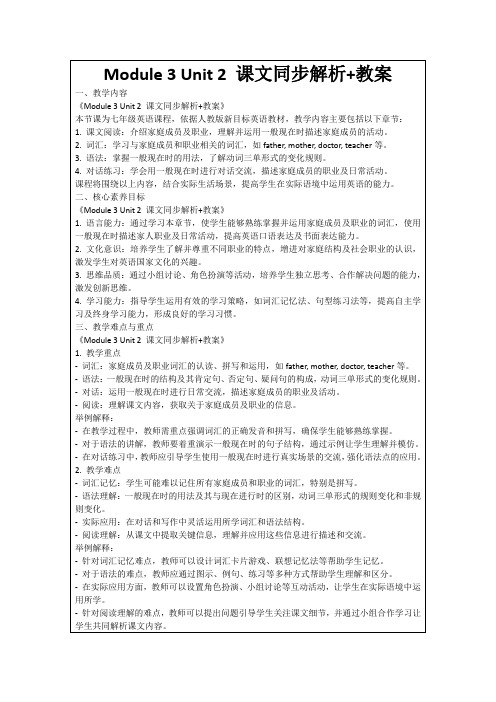
同学们,今天我们将要学习的是《Module 3 Unit 2》这一章节。在开始之前,我想先问大家一个问题:“你们在日常生活中是如何介绍自己的家庭成员和他们的职业的?”这个问题与我们将要学习的内容密切相关。通过这个问题,我希望能够引起大家的兴趣和好奇心,让我们一同探索如何用英语描述我们的家人和他们的工作。
3.成果分享:每个小组将选择一名代表来分享他们的讨论成果。这些成果将被记录在黑板上或投影仪上,以便全班都能看到。
(五)总结回顾(用时5分钟)
今天的学习,我们了解了如何用英语介绍家庭成员和职业,掌握了一般现在时的基本概念和应用。通过实践活动和小组讨论,我们加深了对这些知识点的理解。我希望大家能够掌握这些知识点,并在日常生活中灵活运用。最后,如果有任何疑问或不明白的地方,请随时向我提问。
-阅读:理解课文内容,获取关于家庭成员及职业的信息。
举例解释:
-在教学过程中,教师需重点强调词汇的正确发音和拼写,确保学生能够熟练掌握。
-对于语法的讲解,教师要着重演示一般现在时的句子结构,通过示例让学生理解并模仿。
-在对话练习中,教师应引导学生使用一般现在时进行真实场景的交流,强化语法点的应用。
2.教学难点
五、教学反思
在完成《Module 3 Unit 2》的教学后,我对整个教学过程进行了深入的思考。首先,我发现通过提出与生活密切相关的问题导入新课,能有效激发学生的兴趣和好奇心。大家在讨论家庭成员和职业时,都能积极参与,这为后续的学习打下了良好的基础。
然而,在实际教学中,我也注意到学生在掌握一般现在时和动词三单形式方面存在一定难度。为了突破这个难点,我采用了多种教学方法,如案例分析、对比举例等,但效果仍有待提高。在今后的教学中,我需要更加关注学生的实际需求,设计更具针对性的练习,帮助他们更好地理解和运用这些知识点。
六年级上册英语教案-Unit 3 Lesson 2 Thanksgiving Day Period 4 ∣ 川教版(三年级起点)
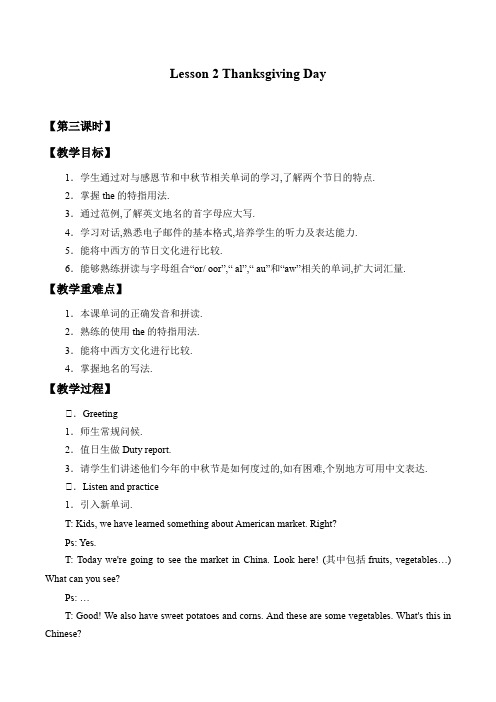
Lesson 2 Thanksgiving Day【第三课时】【教学目标】1.学生通过对与感恩节和中秋节相关单词的学习,了解两个节日的特点.2.掌握the的特指用法.3.通过范例,了解英文地名的首字母应大写.4.学习对话,熟悉电子邮件的基本格式,培养学生的听力及表达能力.5.能将中西方的节日文化进行比较.6.能够熟练拼读与字母组合“or/ oor”,“ al”,“ au”和“aw”相关的单词,扩大词汇量.【教学重难点】1.本课单词的正确发音和拼读.2.熟练的使用the的特指用法.3.能将中西方文化进行比较.4.掌握地名的写法.【教学过程】Ⅰ.Greeting1.师生常规问候.2.值日生做Duty report.3.请学生们讲述他们今年的中秋节是如何度过的,如有困难,个别地方可用中文表达.Ⅰ.Listen and practice1.引入新单词.T: Kids, we have learned something about American market. Right?Ps: Yes.T: Today we're going to see the market in China. Look here! (其中包括fruits, vegetables…) What can you see?Ps: …T: Good! We also have sweet potatoes and corns. And these are some vegetables. What's this in Chinese?Ps:卷心菜.T: In English ,we call it cabbage.Ps: Cabbage.T; Now read after me, cabbage.用同样的方法教学单词lettuce.2.巩固新单词.(1)在黑板上贴出多种食物的图片(包括本课所学的),请学生分别找出西方特有的、中国特有的和中西方共有的食物.(2)记忆游戏:全班分为两组,轮流发言,第二组需在重复第一组先说内容的基础上增添一个新词,如:G1: We like corn.G2: We like corn and turkey.G3: We like corn, turkey and pumpkin pie.3.完成Workbook中的Listen and number.Ⅰ.Listen and write.1.学生看课件图猜主题.2.教师一边读小诗一遍画画,帮助学生了解小诗大意.3.学生跟读,教师解读.T: Well done! Now let's make a little change. Can we use another word for “merrily”?Ps: Look at that boy in the picture. He is merrily smiling. Then look at me, I am sadly smiling. (通过表情变化帮助学生理解) So merrily means…Ps: Happily.T: Clever! Then how about the last line “enjoy the night”? What do you do to enjoy the night?Ps: Play with friends or parents. /Watch the moon. /have delicious food. (教师可先举例进行提示)T: Good! It seems all of you know how to enjoy the night.4.小组活动.四人一组,两人读小诗,两人表演.Ⅰ.Read and make your own ad.T: We have talked so much about Mid-autumn Festival. Now boys and girls, look at this picture. Can you guess what the picture is? Is it a card?Ps: Birthday card, post card…T: Can it be an ad? (会不会是一则广告呢?)PS: Yes.T: I think so. If it is an ad, what's it about? What does the girl want?Ps: Meat, egg…T: Now you can have a discussion in pairs.What does the girl want and why?(参与学生讨论,可适当给出提示)T: P1, can you tell me your guess?P1: She wants moon cakes.T: Why?P1: It's always the best.T: Class, do you agree with him /her?Ps: Yes.T: I agree with you too. And what do the moon cakes have?Ps: Meat, egg, nuts and fruits.T: Great! Do you like this ad?Ps: Yes.T: OK! After class I'd like you to design your ad for moon cakes, and show it to us next time, will you?Ps: Yes.Ⅰ.Look, listen and say.1.复习上节课所学的字母组合“ ar”,“ er”,“ ur”和“ ir”的发音.2.出示图片,让学生读出单词并自己拼写单词.3.学生仔细听录音,然后再模仿,教师订正.4.教师引导学生总结发音规则.5.给出一些没有学过的单词让学生尝试拼读,不要求他们掌握中文意思.【作业布置】为家长表演小诗并请家长打分.。
人教版三年级下册英语全英文教案(全册)
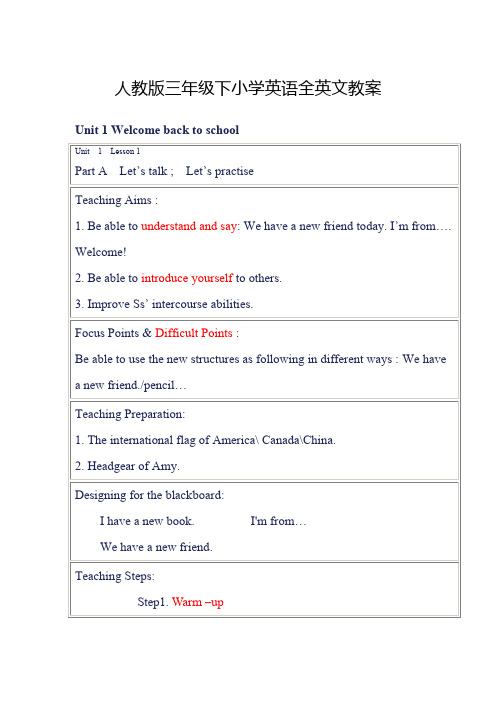
人教版三年级下小学英语全英文教案Unit 1 Welcome back to schoolUnit 2 My Family Teaching Aims:1.Be able to understand and say: This is my family. Who’s that man(woman)? He’s/She’s my…Who’s this boy(girl)? He’s/ She’s my… Come on! Let’s watch T V. Be able to use them in the real situation with the natural tones.2.Be able to listen, say and recognize the main words: father(dad), mother(mom), man, woman, grandfather(grandpa),grandmother(grandma), brother, sister.3.Be able to use the interjection correctly: “ Great!/ Cool!/ Oh!/ Wow!” to express the emotion.4.Be able to listen, say, read and write letters F-I, understand and say the words which begin with F-I, eg: fish, father, goose, girl, hamburger, hot dog, ice-cream, ice.Lesson arrangement:Lesson One: Part A Let’s learn; Let’s sing; Part C CultureLesson Two: Part A Let’s talk ; Let’s practiseLesson Three: Part A Let’s say; Let’s chantLesson Four: Part B Let’s learn; Let’s chant; Part C Story time Lesson Five: Part B Let’s talk ; Let’s pr actise.Lesson Six: Part B Let’s say; Let’s do; Part C Let’s checkUnit 3 How many?Teaching Aims:1.Be able to understand and say: How many …can you see? I can see… How many…do you have? I have… Be able to use them in the real situation with the natural tones.2.Be able to listen, say and recognize the number words:11-20, and use them in daily life.3.Be able to understand and use the phrase which can praise other ones: “ It’s beautiful! How nice!” and use them in the proper situation.4.Be able to listen, say, read and write letters J-M, understand and say the words which begin with J-M eg: jeep, jump, kangaroo, key, lion, lock, milk, mouse, night, nest.5.Be able to understand the orders, and do the actions according to the orders.Lesson arrangement:Lesson One: Part A Let’s learn; Let’s play; Let’s sing.Lesson Two: Part A Let’s talk ; Let’s practiseLesson Three: Part A Let’s say; Part C Story timeLesson Four: Part B Let’s learn; Part C CultureLesson Five: Part B Let’s talk ; Let’s practise.Lesson Six: Part B Let’s say; Let’s do; Part C Let’s check。
七年级英语上册UNIT3知识点
七年级Unit3知识点1.Excuseme,Grace.打扰了,格雷丝。
1)excuse me意为“劳驾;请原谅”,是打扰他人前的客套话,以示礼貌和歉意,主要用于:(1)询问情况,引起别人的注意,如问路,问姓名等。
Excuseme,are you Mr.Smith? 请问,你是史密斯先生吗?(2)征求别人的许可,向对方提出要求。
Excuse me,May I ask you somequestion? 打扰了!我可以问你几个问题吗?(3)打扰别人,打断别人的讲话或正在做的事。
Excuse me!I want to wash my hands. 对不起!我想要洗手。
辨析:excuse me与I’m sorry.excuse me多用于麻烦,打扰或有求于人通常用于打扰他人之前可用于打扰他人之后I’m sorry指因做错了事,心中难过,有愧于莫人或莫事而道歉---Excuse me,what’sthis in English?打扰一下,这个用英语怎么说?---I’m sorry.I don’tknow.对不起,我不知道。
I’m sorry I left my wallet at home. 对不起,我把钱包落在家里了。
---______.Is this yourbook?---Yes,it is.Thankyou!A.SorryB.HelloC.Excuse me解析:我们可采用“情景交际法”解答本题。
由Is this your book?(这是你的书吗)知这是询问别人问题。
在询问别人之前,应先用excuse me(打扰了,劳驾)以示礼貌,故选C.答案:C2)me是人称代词宾格,意为“我”,通常用在动词或介词之后做宾语,其主格形式为I。
Please help me.请帮帮我。
My friend showed(给……看)______some old photos of hisfamily.A.myB.IC.meD.mine解析:我们可采用“语法分析法”解答本题。
八年级英语上册仁爱版教案:Unit 3 Topic 2 Section C
八年级上册教案设计Unit 3 Our HobbiesTopic 2 What sweet music!Section CⅠ. Material analysis本节课主要活动为1a和2b。
Section A 通过歌手席琳·迪翁谈论音乐会,Section B谈论不同风格的音乐,在内容上Section C是对Section A 和Section B的升华,从音乐会到不同形式的音乐再到人们熟悉的伟大作曲家莫扎特,通过层层递进的方式步步拓展到阅读和写作的综合能力的培养。
在培养学生能力的方面也从培养学生听说能力过渡到培养写作能力。
老师们在设计课堂的时候应用教材上所设计的表格和问题等多种读中和读后活动。
以此为基础,通过竞赛、将自己已有知识和文章进行对比等方式,逐一完成信息输入、阅读技能培养、信息输出的过程。
Ⅱ. Teaching aimsKnowledge aims:1. 在图片、同义句替换等方式的帮助下,能自己拼读下列单词:age,wonder,note,papa,press,smile,amazing。
2. 能通过游戏快速记忆本课生词,如:wonder,note,smile,understand等。
3. 能在练习中使用感叹句表达自己的情感。
4. 能够用感叹句评价某人或某物。
Skill aims:1.能基本听懂本课文本材料,及与其水平相当的伟人介绍。
2. 能流利地和他人谈论自己或朋友喜欢的音乐家。
3. 能正确地使用因特网、能从中获取有用信息并基本读懂其中介绍音乐家的文章。
4. 能正确模仿本课课文,有条理地写出自己喜欢的音乐家的故事。
Emotional aims:通过对伟大人物事迹的学习,从伟人平凡的故事当中领悟做人做事的态度。
明白天才源于汗水和努力。
Ⅲ. The key points and difficult pointsKey points:1. 用感叹句表达自己的情感。
2. 根据关键词复述文章,如:composer,start writing,a child等。
Module3Unit2课件九年级英语上册
评价任务
1.完成任务驱动一,达成学习目标1。 2.完成任务驱动二,达成学习目标2。 3.完成任务驱动三,达成学习目标3和4。
预习导学
一、生词速查 1. Canadian adj. 加拿大的;加拿大人的→Canada n. 加拿大 2. sick adj. (感觉)不适的,生病的→sickness n. 疾病;恶心 →a sick boy 一个生病的男孩 3. treat v.医治;治疗→treatment n.处理;治疗 4. wound n.伤;伤口→wounded adj.受伤的 5. dying adj.垂死的;即将死亡的→die v.死亡 6. care n. & v. 照顾;照料→careful adj. 细心的
合作探究
Dr. Bethune developed new ways of taking care of the sick. 白求恩医生研究出了照料病人的新方法。
【例句呈现】 1.The nine-year-old girl looks after her sick father. 这个 九岁的女孩照顾她生病的父亲。 2.My grandmother has been sick/ill for over two years.我奶 奶已经病了两年多了。
合作探究
◎学法指导:从以上四个方面介绍伟人袁隆平,对伟人袁隆平 有一个全面的了解,为写作打下基础。
2.根据上面的句子描写一篇英语短文来介绍伟人袁隆平。
合作探究
Yuan Longping is one of the most famous agricultural scientists in China. Here are some facts about him.
合作探究
Module3Unit2课件初中英语九年级上册
Canada
Canadian
sick
soldier
wound
wounded
war
tool
invention
useful
himself
continue
15
Reading
Work in pairs. Look at the picture in Activity 2 and discuss who the person is and what he did. Use the words in the box to help you.
白求恩医生救治中国伤员的伟大事迹成就了他在中国的英雄地位。许多 书和电影都讲述了他的事迹。至今,他在加拿大和中国仍然为人们所纪念。
20
Reading
The language points
1. 重点短语: die for, take care of, so that, at the time, on one’s own, manage to do sth, both...and...
The doctors could learn about how he treated the sick.
Six-nine hours.
Many people were dying because they did not get to hospital quickly enough. His work for the Chinese people. He helped treat the wounded during the AntiJapanese War.
Learn the new words
operation /ˌɒpəˈreɪʃn/ n. 手术
- 1、下载文档前请自行甄别文档内容的完整性,平台不提供额外的编辑、内容补充、找答案等附加服务。
- 2、"仅部分预览"的文档,不可在线预览部分如存在完整性等问题,可反馈申请退款(可完整预览的文档不适用该条件!)。
- 3、如文档侵犯您的权益,请联系客服反馈,我们会尽快为您处理(人工客服工作时间:9:00-18:30)。
LOGO
Paragraph 2
LOGO
Anyway, even if one wanted to, one couldn’t put the clock back to an earlier age. 1. put/turn the clock back: return to a situation that used to exist , usually because the present situation is unpleasant. 倒退,开倒车
• •
Part Division of the Text About Part Two
2. Part Division of the Text
Parts Lines Main s
Home
1
1~32
The public needs education in science so as to make informed decisions on their own fate. What can be done to educate the public about science. Human civilization will survive if the public understands science well.
T
现代社会的人们很难熬过没有电的日子。 It is very difficult for people in the modern society to do without electricity.
Paragraph 1
3. …and childbirth was highly risky for woman… adv. 1) Very 很,非常 S Mr. Smith was a highly successful salesman 2) to a high degree 程度高的 S Most of the people present at the meeting are highly educated women. He speaks very highly of you.
Paragraph 1
LOGO
Words and Expressions 2. …though even they had to do without modern medicine… do without: manage to survive, continue, or succeed, although you do not have sth. you need 没有…而设法对付过去 S I haven’t enough money to buy a car, so I’ll just have to do without. You have to do without your dinner if you don’t get back on time.
T
Paragraph 1
CF: probable >likely> possible
LOGO
系常用词, 从表面迹象来看很有可能 例如: 很有可能。 likely 系常用词, 指从表面迹象来看很有可能。例如: The likely outcome of the contest varies from moment to moment. 指由于有适当的条件和方法, 某事可能发生或做到, 强调客 possible 指由于有适当的条件和方法, 某事可能发生或做到, 强调客 观上有可能, 但常含有实际希望很小的意思。例如: 实际希望很小的意思 观上有可能, 但常含有实际希望很小的意思。例如: Is it possible to get to the city by train, or must I take a bus? 有根据、合情理、值得相信的 probable 语气比 possible 强, 指有根据、合情理、值得相信的, 带 有大概、很可能的意思。例如: 有大概、很可能的意思。例如: It is probable that he has forgotten our appointment.
A Brief History of Time
LOGO
(One of his books to make his work accessible to the public.)
Detailed Reading
LOGO
Paragraph 1
LOGO
S
Words and Expressions 1. …It is likely to change even more in the next hundred. 1) probable a. Pattern: it is likely that… …be likely to do sth It is likely that my family members will watch the opening ceremony of the Asian Games together. Typhoon Megi is likely to attack the southeastern part of Guangdong province.
--1942 --1958
Born in Oxford, England.
Entered Oxford University and became especially interested in thermodynamics(热力学), relativity theory, and quantum mechanics (量子力学). --1962 Received a bachelor’s degree in physics and then enrolled as a research student in general relativity at the University of Cambridge .
Paragraph 2
LOGO
Paragraph 1
LOGO
2) Probably adv. Often preceded by most or very etc. it is not used as adv alone.
S
We will most likely watch the Asian Games at home. It is said that Jack Chen will very likely come to Guangzhou this weekend. 春节期间我们最有可能呆在家里。 春节期间我们最有可能呆在家里。 We will most likely stay at home during the spring festival.
2
33~62
3
69~67
LOGO
LOGO
Part two
What are the two aspects the author emphasizes to answer the question he brings up in this part ? 1. The teaching of science in schools must be improved. 2. Greater importance must be attached to the use of mass media, especially to television programs that educate the public about science and keep it informed of the latest scientific developments.
LOGO
2.Chronology of Stephen Hawking
Home
LOGO
Oxford University
2.Chronology of Stephen Hawking
Home
LOGO
University of Cambridge
Home
2.Chronology of Stephen Hawking --1966 Earned his Ph.D. degree at the University of Cambridge. Stayed at the University of Cambridge to do post-doctoral research. Diagnosed as having Amyotrophic Lateral Sclerosis (ALS) (肌萎缩性脊髓侧索硬化). ( ).
LOGO
2.Chronology of Stephen Hawking
-- 1977
Home
Became a professor of physics. -- 1979 Appointed Lucasian Professor of Mathematics at Cambridge, a post once held by Isaac Newton. This is a picture of Stephen, Isaac Newton and Albert Einstein.
Unit 3
Public Attitude towards Science
LOGO
2010-11-04
LOGO
Warm-up
• In your opinion, what’s the greatest invention in human history , why?
LOGO
Global Reading
Paragraph 2
LOGO
…the force of competition would still bring about advances in technology. 2. bring about : cause to happen 引起,导致
